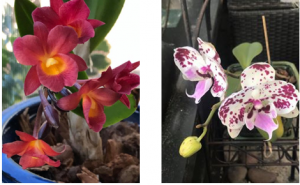A half-day field trip to Orchid Jungle down in South Florida put orchids on my list of ‘MUST HAVE’ plants. The scents and beauty of the blooms took my breath away. There was even an orchid which smelled just like chocolate! What most people do not realize is that with keeping orchids, you have beauty and easy-care!
Many people have some very complicated management plans for their orchids. But not all orchids need or require that sort of intense care. It is entirely possible to grow gorgeous orchids with little to no maintenance at all. Below are some pictures of a few orchid enthusiasts’ collections along with their care plans:
Orchid Examples:
- Blayne Throm’s Phalaenopsis, or Moth orchids, originally gifted to her in-laws, were later tucked into the elbows of live oak trees after their initial blooms faded. According to Blayne, “Each plant has tons of blooms each season and to be honest, they only get watered with rainy days and aren’t fed anything.” Moth orchids are very popular in garden centers due to their ease of production and long lasting blooms available almost year-round.

Moth Orchids in Live Oak trees, photos by Blayne Throm - Tracy Starling has these colorful orchids in containers. She waters only when they are dry and feeds them when they are not blooming.

Tracy’s colorful potted orchids, photos by Tracy Starling. 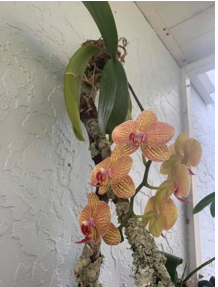
Karissa’s apricot-hued orchid growing on a branch of wood, photo by Karissa Danielle Johns. - Karissa Danielle Johns swears by potting her orchids in bark or attaching them to interesting tree branches using sphagnum moss. They bloom often in the natural warmth and humidity of Florida’s climate.
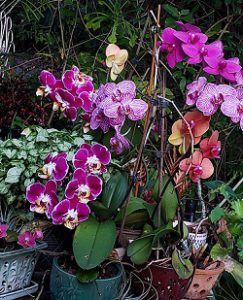
- Julia Krochmalny has potted orchids that are the epitome of low-maintenance. Watered only in dry spells and rarely fed, these orchids are a lovely sight set on a table under oak trees near the front door.

- Lee Day shared this photo of her pot of ‘gorgeousness’. This prolific beauty is on the northern fence of her backyard. It is watered by rain and the potting mix is changed every two years.
My Own Orchid Divisions
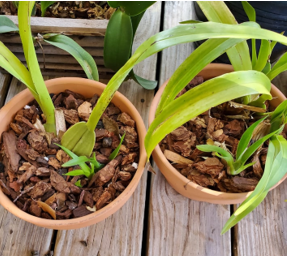
Last October, I purchased two clusters of orchids at a yard sale for $2. They were then divided and placed in fresh potting mix and new pots, picture on the right. All the orchids are watered weekly with a diluted solution of orchid fertilizer. They are currently multiplying and I am hoping for blooms by end of summer.
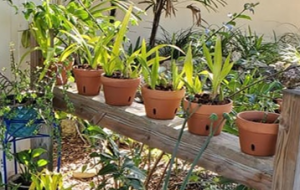
Should an orchid become sickly, it is important to find the cause. Despite their relative ease of care, there are many pests which could infest orchid plants as well as a few important fungal diseases. For a short list of four publications on orchid problems and pollination in Florida, please see the orchid topic page on the University of Florida EDIS website: https://edis.ifas.ufl.edu/topic_orchids.
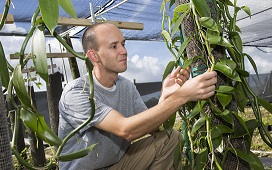
Did you know that Culinary vanilla comes from an orchid vine? The University of Florida’s Tropical Research and Education Center (TREC) has one of the largest collections of Vanilla orchid varieties in the world. As the name implies, TREC does research on these orchids to find which is best for flavor, for production, and for ease of care. To learn how to grow the Vanilla Orchid, please see the EDIS publication HS1348: “Vanilla Cultivation in Southern Florida”.
 1
1

